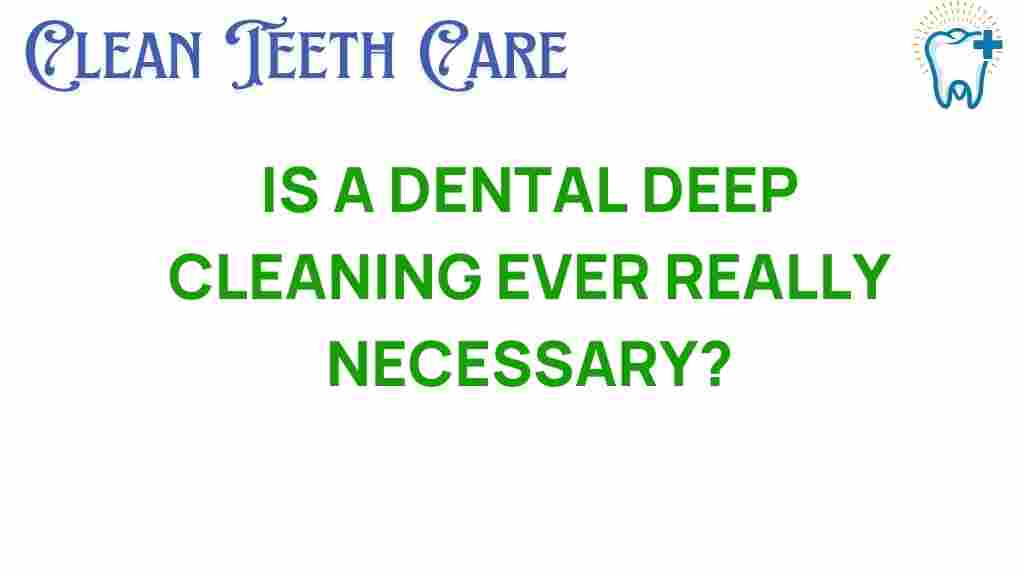Unveiling the Truth: Is a Dental Deep Cleaning Truly Essential?
Maintaining optimal oral health is crucial for overall well-being, and one of the most debated topics in dentistry is whether a dental deep cleaning is truly essential. Many patients may wonder if this procedure is necessary for their dental hygiene routine, especially when preventive care and regular teeth cleaning are already part of their regimen. In this article, we will delve into the intricacies of dental deep cleaning, its importance, and its role in combating gum disease and promoting better oral health.
Understanding Dental Deep Cleaning
A dental deep cleaning, also known as scaling and root planing, is a specialized procedure aimed at removing plaque and tartar buildup from below the gum line. Unlike a standard teeth cleaning, which primarily focuses on the visible surfaces of the teeth, a dental deep cleaning targets the areas that regular brushing and flossing might miss.
Here’s a quick overview of what dental deep cleaning involves:
- Scaling: This process removes plaque and tartar from the tooth surface and beneath the gums.
- Root Planing: This smooths out the roots of the teeth to help gums reattach and heal.
Why is Dental Deep Cleaning Important?
Dental deep cleaning is essential for several reasons, particularly in the context of preventing gum disease and maintaining good oral health:
- Prevention of Gum Disease: Gum disease, or periodontal disease, can lead to severe health issues if left untreated. Deep cleaning removes harmful bacteria that contribute to this condition.
- Improved Oral Hygiene: Regular dental deep cleaning helps to maintain overall dental hygiene, ensuring that plaque removal is thorough.
- Better Breath: Removing bacteria and debris from below the gum line can significantly improve bad breath.
- Long-Term Dental Health: Investing in preventive care through deep cleaning can save you from more extensive dental treatments in the future.
Who Needs a Dental Deep Cleaning?
Not everyone requires a dental deep cleaning, but certain conditions may warrant the procedure:
- Patients diagnosed with gingivitis or periodontitis.
- Individuals with a history of gum disease.
- Those with excessive plaque and tartar buildup.
- Patients with persistent bad breath or gum inflammation.
The Process of Dental Deep Cleaning
Understanding the process of dental deep cleaning can help patients feel more comfortable and informed about their treatment. Here’s a step-by-step breakdown:
Step 1: Initial Consultation
Your dentist will begin with an examination of your teeth and gums, assessing the level of plaque buildup and the health of your gums. They may take X-rays to evaluate bone loss and the extent of gum disease.
Step 2: Anesthesia
To ensure comfort during the procedure, local anesthesia may be administered. This helps numb the areas being treated, making the process more tolerable.
Step 3: Scaling
Using specialized instruments, your dentist or dental hygienist will remove plaque and tartar from the tooth surface and beneath the gums. This may be done manually or with ultrasonic tools that vibrate to break up deposits.
Step 4: Root Planing
After scaling, the roots of your teeth will be smoothed out to remove rough spots that harbor bacteria. This promotes healing and allows the gums to reattach to the teeth.
Step 5: Post-Cleaning Care
Your dentist will provide you with post-care instructions, which may include recommendations for oral hygiene practices, follow-up appointments, and any necessary medications.
Step 6: Follow-Up Visits
Regular follow-up visits are vital to monitor the health of your gums and ensure that any signs of gum disease are addressed promptly. These visits may include additional cleanings as needed.
Troubleshooting Tips for Oral Health
Even after a dental deep cleaning, it’s essential to maintain good oral health. Here are some troubleshooting tips to help you stay on track:
- Brush Twice Daily: Use a fluoride toothpaste and a soft-bristled toothbrush to clean your teeth for at least two minutes each time.
- Floss Daily: Flossing helps remove food particles and plaque between teeth that your toothbrush can’t reach.
- Use Antimicrobial Mouthwash: Rinsing with an antibacterial mouthwash can help reduce plaque and prevent gum disease.
- Regular Dental Check-Ups: Schedule regular visits to your dentist for professional cleanings and examinations.
Patient Education on Dental Hygiene
Educating patients about the importance of dental hygiene and the role of dental deep cleaning in maintaining oral health is critical. Here are some key points to consider:
- The Role of Plaque: Explain how plaque forms and can harden into tartar, leading to gum disease.
- Signs of Gum Disease: Educate patients on the symptoms of gum disease, such as swollen gums, bleeding when brushing, and persistent bad breath.
- Importance of Preventive Care: Emphasize the benefits of preventive care, including dental deep cleaning, to avoid more invasive treatments in the future.
Conclusion: Is Dental Deep Cleaning Essential?
In conclusion, dental deep cleaning is a vital component of maintaining oral health, particularly for individuals at risk of gum disease. While regular teeth cleaning is important, deep cleaning targets areas that need special attention, ensuring thorough plaque removal and promoting gum health. By understanding the process and committing to regular dental visits, patients can significantly improve their oral hygiene and overall well-being.
If you’re considering a dental deep cleaning or have questions about your oral health, don’t hesitate to consult your dentist. They can guide you through the necessary steps and help you understand the importance of preventive care in your dental treatments.
For more information on dental hygiene practices, you can visit MouthHealthy.org.
For more insights on dental treatments, check out our dental resources.
This article is in the category Treatments and created by CleanTeethCare Team
